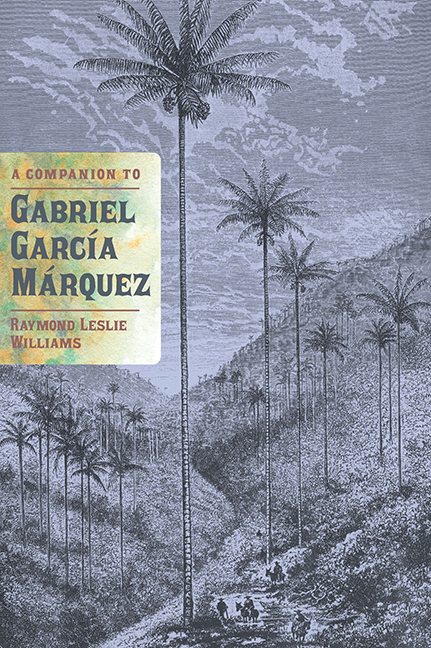Book contents
- Frontmatter
- Dedication
- Contents
- Abbreviations
- Foreword
- 1 García Márquez, the Modernists, and the Boom
- 2 Cien años de soledad and the Macondo Cycle
- 3 El otoño del patriarca and the Political Writings
- 4 Postmodern Gestures: El amor en los tiempos del cólera, Crónica de una muerte anunciada, and La increíble y triste historia de la cándida Eréndira y de su abuela desalmada
- 5 Recent Writing
- 6 Epilogue
- Guide to Further Reading
- Select Bibliography
- Index
- Frontmatter
- Dedication
- Contents
- Abbreviations
- Foreword
- 1 García Márquez, the Modernists, and the Boom
- 2 Cien años de soledad and the Macondo Cycle
- 3 El otoño del patriarca and the Political Writings
- 4 Postmodern Gestures: El amor en los tiempos del cólera, Crónica de una muerte anunciada, and La increíble y triste historia de la cándida Eréndira y de su abuela desalmada
- 5 Recent Writing
- 6 Epilogue
- Guide to Further Reading
- Select Bibliography
- Index
Summary
In 1982 Gabriel García Márquez was internationally recognized as a worldclass writer when he was awarded the Nobel Prize for Literature. From 1967 to 1982, during the fifteen-year period between the publication of Cien años de soledad and the award of the Nobel Prize, he received any number of awards. In 1972 he was recognized twice: with the Rómulo Gallegos Prize in Caracas (at the time the major literary prize for work in the Spanish language), and with the Neustadt Prize in the United States. During this period, he was often compared to the very writers who had been his main role models: William Faulkner, Franz Kafka, and Jorge Luis Borges. He was also compared to many of his contemporaries who were already international celebrities, such as Italo Calvino, William Styron, and John Barth.
In Latin America, García Márquez belongs to a generation of writers who felt an urgent need to modernize a Latin American literature that for them was far too embedded in the realist tradition, and all too often imprisoned in nationalisms or regionalisms that were, by the 1950s and 1960s, no longer viable. Thus, García Márquez, along with Carlos Fuentes, Mario Vargas Llosa, Julio Cortázar, José Donoso, and a host of others, made the case in his fiction, essays, and public stances that the time had arrived for a modern Latin American literature. García Márquez is a dedicated modernist who occasionally exhibits some postmodern gestures.
Of course, García Márquez, Fuentes, and Cortázar were not the first Latin American intellectuals to call for this modernization. The original impetus came in the 1920s when Borges, Huidobro, and the vanguardistas from Buenos Aires to Mexico City made their first modernist inroads in Latin America. Their work, however, was largely ignored for several decades. In the 1940s, Borges, Asturias, Yáñez, Marechal, Carpentier, and others published fiction that indicated a major shift toward invention and modernization. Rulfo's Pedro Páramo (1955) was an equally significant contribution to this shift, and that work was an important model for García Márquez in particular.
It was with the 1960s Boom, however, that the labors of three generations of Latin American writers finally came to fruition, and Latin American literature was no longer viewed as the folkloric or provincial cultural vehicle that it was when the leading writers of Latin America were Rómulo Gallegos, Ricardo Güiraldes, José Eustacio Rivera, and Mariano Azuela.
- Type
- Chapter
- Information
- A Companion to Gabriel García Márquez , pp. 145 - 166Publisher: Boydell & BrewerPrint publication year: 2021



